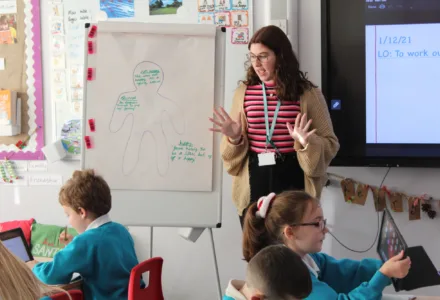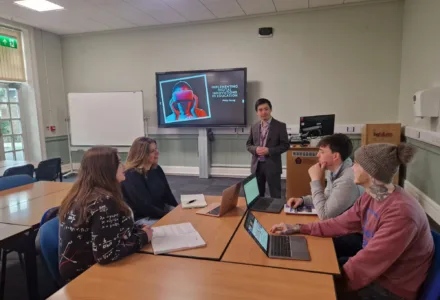Why study this course
The programme provides dedicated focus on the unique needs of Early Years education.
Study your way with our three flexible study modes that fit your lifestyle.
You’ll develop the confidence to advocate for positive change for babies and young children.
Course summary
Our MA Early Years Education is designed for practitioners who wish to build expertise in early childhood education and support the development of research informed and evidence-based practice. Available in three study modes—full-time (1 year), part-time blended (2 years), and part-time online (2 years)—this programme allows you to examine current practice and policy while developing your knowledge of early years settings. You'll gain a systematic understanding of key national and global issues relating to Early Years Education, build critical awareness of theory and practice, and strengthen your research skills. The course suits professionals across various contexts including education, social care, and health, helping you enhance both your professional practice and career prospects in this important field.
Whether you are currently in a professional setting or preparing for future roles across various contexts including education, social care, and health, the programme supports both practical application and the development of insights that can inform and shape your future practice
Key facts
|
Award |
MA |
|---|---|
|
Duration |
1 or 2 years |
|
Mode of study |
Full/Part-time |
|
Start date |
September 2025 |
|
Award |
Bishop Grosseteste University |
|
Institution code |
B38 |
Apply for this course
When you're ready to apply, the route you take will depend on your personal circumstances and preferred method of study. Click the relevant button below to start your application journey.
About this course
This master's programme develops your in-depth knowledge and skills related to current and evolving Early Years practice. You'll investigate different social and educational contexts while building advanced understanding of key issues in the sector.
Full-time students will complete five modules over one year: two modules in your first trimester focusing on vision, practice, policy, and global childhood perspectives; two modules in your second trimester covering leadership in Early Years practice and research skills; and a final research project in your third trimester.
Part-time blended students study over two years, combining online learning with three on-campus MA Weekends each year (held in October, February, and June, typically on a Friday evening and Saturday).
In your first year you will take one module per trimester starting with a core module on Vision, Practice and Policy, followed by two optional modules tailored to your interests. In Year 2, you will begin with a core module on research skills, then carry out your own research project across Trimesters 2 and 3.
Part-time online students study over two years, with 100% online delivery designed to offer maximum flexibility. The learning is largely asynchronous, allowing you to study at times that suit your schedule. This study mode is ideal for practitioners in full-time employment, including those who are working outside of the UK.
In your first year you will take one module per trimester starting with a core module on Vision, Practice and Policy, followed by two optional modules tailored to your interests. In Year 2, you will begin with a core module on research skills, then carry out your own research project across Trimesters 2 and 3.
Entry requirements
Entry to the MA Early Years Education programmes typically requires a second-class degree (2:2 or above) in a relevant subject. However, we understand that many excellent candidates may not have studied Early Years Education at undergraduate level or may have developed relevant skills through professional experience rather than formal qualifications.
We assess each application individually, recognising that academic potential can be demonstrated through various professional and educational backgrounds. We value diverse professional backgrounds and recognise that valuable skills can be developed through various pathways.
For international applicants, English language requirements are IELTS 6.5 with a minimum of 6 in each component.
Full-time students: There is no requirement of work-related learning.
Part-time blended students: Learners are expected to hold a professional role (paid or voluntary) within an educational setting for the duration of the course, typically 5 hours a week.
Part-time online students: Learners are expected to hold a professional role (paid or voluntary) within an educational setting for the duration of the course, typically 10 hours a week.
If your workplace or professional setting requires a Disclosure and Barring Service (DBS) check, please note that you will be responsible for covering this cost.
If you have any questions about the entry requirements for this course, please contact our Enquiries team for advice on +44 (0) 1522 583658 or email courseenquiries@bishopg.ac.uk.
Further information
Click here for important information about this course including additional costs, resources and key policies.
In accordance with University conditions, students are entitled to apply for Recognition of Prior Learning, RP(C)L, based on relevant credit at another HE institution or credit Awarded for Experiential Learning, (RP(E)L).
How you will be taught
The curriculum blends academic theory with practical application, enabling you to apply what you learn directly to your context of interest. To support this, teaching methods vary across the three study modes, designed to accommodate different learning needs:
Full-time students will be fully engaged in a dynamic learning environment with our campus-based sessions. Whether you are preparing to begin a career in education or you have already been working as a practitioner, this programme will help you develop your knowledge and skills to strengthen your future practice and deepen your understanding of the field.
Learning takes place through a variety of activities, including lectures, seminars, workshops and tutorials. You will take part in discussions with peers and tutors, complete independent tasks relevant to a range of topics, and receive individual supervision for your research project. Each module includes assignment workshops and tutorials where you can ask questions and receive guidance on your work.
Part-time blended students
During MA Weekends, you will take part in taught sessions, peer networking, and academic support activities. Between weekends, you will engage with online learning through the virtual learning environment, accessing pre-recorded materials, visual presentations, recommended readings, and interactive tasks. You will also have online or in-person tutorials to discuss assignments and receive feedback.
Throughout the programme, you will be encouraged to apply theory to practice by reflecting on your own professional experience and context. This reflective approach helps deepen your understanding and ensures your learning remains relevant and impactful.
Part-time online students
Throughout the programme, you will be encouraged to apply theory to practice by reflecting on your own professional experience and context. This reflective approach helps deepen your understanding and ensures your learning remains relevant and impactful.
The interactive design of the course supports meaningful engagement with learning materials and encourages collaboration with peers from a wide range of educational settings and contexts. Learning materials include pre-recorded materials, visual presentations, recommended readings, and interactive tasks. You will also benefit from regular opportunities for personalised support, through Q&A opportunities, assignment webinars, and online tutorials. While most activities are asynchronous, occasional synchronous sessions help build connections and maintain a positive learning community.
Assessment
All delivery modes use similar assessment approaches, offering varied ways to demonstrate your skills, knowledge and understanding. Each assignment typically contains at least two related tasks, allowing you to meet learning outcomes while developing various academic skills. The different types of assessment include:
- Portfolios
- Presentations with Q&A sessions
- Research method evaluations
- Dissertations based on independent research projects
You will receive formative feedback during each module via tutorials, which will guide your development and allow you to refine your work before final submission.
Assessment deadlines are timed to coincide with academic holiday periods (January/May/August), making the workload more manageable for those with personal and professional commitments.
Careers & Further study
The MA Education (EAL) responds to growing demand for specialists in this field, with organisations seeking staff with expertise in supporting children and young adults with additional needs, including EAL.
Completing this MA positions you strongly for roles requiring specialist knowledge of EAL provision, whether in educational settings, leisure industries, or sporting organisations. The qualification is particularly valuable for those aspiring to leadership positions where a whole-school EAL strategy is required.
Throughout the programme, you'll develop transferable skills including critical analysis, research competence, reflective practice, and decision-making in complex situations. These skills enhance your effectiveness in current roles while opening doors to new opportunities.
This MA also provides an excellent foundation for those wishing to pursue doctoral study through EdD (Doctor of Education) or PhD programmes.
What Our Students Say
Discover what life is like at Bishop Grosseteste University from our students.
Support
Studying at BGU is a student-centred experience. Whether you are on campus or studying online, you will be part of a friendly and supportive community where meaningful connections matter. You will get to know staff personally and feel confident reaching out for help and advice. No matter how you study, you will benefit from regular interaction with staff who recognise and value you as an individual with unique talents and interests.

We will be there to support you, personally and academically, from induction to graduation.
At BGU we have so much support available for our students, the type of support that has won us awards recently in the What Uni Student Choice Awards 2023, such as the Chaplaincy team, the Student Advice team, CELT, BGFutures and representatives at the Students’ Union.
Fees & Funding
A lot of student finance information is available from numerous sources, but it is sometimes confusing and contradictory. That’s why at BGU we try to give you all the information and support we can to help to throughout the process. Our Student Advice team are experts in helping you sort out the funding arrangements for your studies, offering a range of services to guide you through all aspects of student finance step by step.
Click here to find information about fees, loans and support which will help to make the whole process a little easier to understand. For all applicants, there are full instructions at UCAS to make it as easy as possible for you to fill in your online application, plus help text where appropriate. Full details of all tuition fees can be found here.
For all applicants, there are full instructions here to make it as easy as possible for you to fill in your online application, plus help text where appropriate.















































